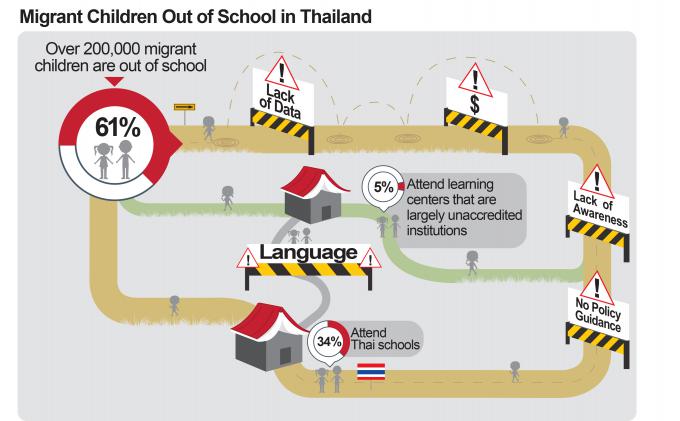PATHWAYS TO A BETTER FUTURE: EDUCATION FOR MIGRANT CHILDREN IN THAILAND

Around the world more people than ever are migrating. Figures from the UN show that 232 million people, or 3.2 per cent of the world’s population, live abroad worldwide, compared with 175 million in 2000 and 154 million in 1990. Migrant children face particular challenges in accessing their rights are often excluded from government social services and face particular challenges to enroll and learn in school due to language barriers. Save the Children's focus on the most deprived must urge us to find innovative solutions to supporting hard to reach migrant populations, and building a strong advocacy voice for their rights. In Thailand, Save the Children has been doing just that through our recent research and advocacy on migrant education.

The research include a review of secondary data and literature, as well as field research, primarily focused on communities from Myanmar. The research also involved the application of a reading assessment with migrant children in Thai schools and in Burmese language learning centers.
Some key findings of the research are:
- There is a crisis of education access for migrant children in Thailand. There are estimated to be between three and four hundred thousand children of migrant workers in Thailand, but only about a third of children were found to be in any form of education. Of those who do enroll in Thai primary education, only about 4% make it into the secondary level
- While the numbers of migrant children in school has been increasing thanks to the Royal Thai Government's Education for All policy, this policy is not always consistently implemented in different regions and schools.
- Other key barriers to accessing education are a lack of awareness of their rights amongst migrant communities, economic hardship and the need for older children to work, a lack of accurate data on the whereabouts of out of school children, and language barriers.
- The reading assessment shows that migrant children can learn well in Thai schools when they have extra language support. Many children without this support are struggling to understand simple texts, which underlines the importance of considering language in education.
Save the Children is currently working with partners in the Mae Sot and Bangkok regions to improve migrant education access and quality. Building on our theory of change, Save the Children Thailand is using this research for our advocacy strategy with the Thai government, beginning with a policy panel held last month. Since the policy panel we have recently been in dialogue about establishing an NGO-Government working group to systematically address the challenges identified in the research.
The policy briefing, full report, and reading assessment reports can be found in these links:
Policy Brief (English)
https://thailand.savethechildren.net/sites/thailand.savethechildren.net/files/library/Policy%20Brief_Eng_final_resized.pdf.
Full Report (English)
https://thailand.savethechildren.net/sites/thailand.savethechildren.net/files/library/Migrant%20education%20annual%20report_full_resized.pdf.
Reading Assessment (English)
https://thailand.savethechildren.net/sites/thailand.savethechildren.net/files/library/Reading%20Assessment_Migrant%20Education%20Report_resized.pdf.


